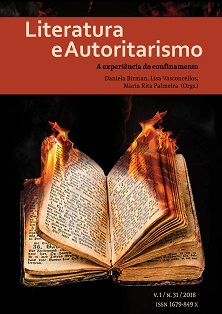Políticas do esquecimento: trauma e fantasmagoria nas culturas brasileira e portuguesa
DOI:
https://doi.org/10.5902/1679849X31047Keywords:
Prison Island, Luso-brazilian literature, Trauma and phantasmagoriaAbstract
There is scarce literary production concerning the Colonia Correcional da Ilha Grande e the Portuguese prisoners camp of Tarrafal. Given that those were major correctional institutions, we take that lack of literary works as an index of the problems faced both by Portugal and Brazil in dealing with the memories of the dictatorial regimes that took place in those places during the 20th century. Written under the influx of pain and trauma, the testimonial and fictional texts that deal with those prisons are marked by conflicts and denegation (Freud, 2010) towards the violence experienced by their authors. In such a context – according to Roberto Vecchi and Margarida Calafate Ribeiro (RIBEIRO & VECCHI, 2011) – the concepts of phantasmagoria, remain and trace (spuren) proposed by Walter Benjamin can work as a theoretical provocation that could help the understanding of the literary culture that rises from violent contexts. In this paper we will do a comparative study of the books Memórias do cárcere (1953), by Graciliano Ramos and Tarrafal: o campo da morte (1978), by Cândido de Oliveira. We seek to understand how both works are haunted by the ghosts of silence and repression, but decide to face then using literature as tools.Downloads
References
AGAMBEN, Giorgio. Estado de exceção. São Paulo: Boitempo, 2004. Original italiano.
AGAMBEN, Giorgio. Homo sacer: o poder soberano e a vida nua I. 2ª ed. Belo Horizonte: Editora UFMG, 2010. Original italiano.
AGAMBEN, Giorgio. O que resta de Auschwitz. São Paulo: Boitempo, 2008. Original italiano.
ANTELME, Robert. A espécie humana. Rio de Janeiro: Record, 2014.
AQUINO, Acácio Tomás de. O segredo das prisões atlânticas. Torres Vedras: A regra do jogo, 1978.
ARENDT, Hannah. Origens do totalitarismo. São Paulo: Companhia das Letras, 1989.
BENJAMIN, Walter. O anjo da história. Trad. João Barrento. Lisboa: Assírio & Alvim, 2010.
BENJAMIN, Walter. Teses sobre a história. In: Magia e técnica, arte e política. São Paulo: Brasiliense, 1994. Original alemão.
CARNEIRO, Maria Luiza Tucci; CROCI, Federico (Org.). Tempos de fascismos: ideologia – intolerância – imaginário. São Paulo: Edusp/ Imprensa oficial/ Arquivo público do Estado de São Paulo, 2010.
FREUD, Sigmund. “O estranho”. In Edição Standard Brasileira das Obras completas de Sigmund Feud. v. XVII. Rio de Janeiro: Imago, 1976.
FREUD, Sigmund. “Luto e melancolia”. In Edição Standard Brasileira das Obras completas de Sigmund Feud. v. XIV. Rio de Janeiro: Imago, 1976.
LESSA, Orígenes. Ilha grande: do jornal de um prisioneiro de guerra. São Paulo: Companhia Editora Nacional, 1933.
LEVI, Primo. Se é isso um homem? Rio de Janeiro: Rocco, 1988.
OLIVEIRA, Cândido de. O pântano da morte. Lisboa: Editorial República, 1974.
OLIVEIRA, Gilberto de. Memória viva do Tarrafal. Lisboa: Avante, 1987. (1936-1954): a origem e o quotidiano. Lisboa: Colibri, 2007.
RAMOS, Graciliano. Memórias do cárcere. 2 vols. São Paulo: Record, 1993.
RIBEIRO, Margarida; VECCHI, Roberto. “A memória poética da Guerra Colonial de Portugal na África”. In: SEDLMAYER, Sabrina; GINZBURG, Jaime. Walter Benjamin: rastro, aura e história. Belo Horizonte: Editora UFMG, 2012.
SANTOS, Myrian Sepúlveda dos. Os porões da república: a barbárie nas prisões da Ilha Grande: 1894-1945. Rio de Janeiro: Garamond, 2009.
TAVARES, José Manuel Soares. O campo de concentração do Tarrafal
VÁRIOS. Tarrafal, testemunhos. Lisboa: Caminho, 1978.
VECCHI, Roberto. Excepção atlântica: pensar a literatura da guerra colonial. Porto: Afrontamento, 2010.
Filme
Tarrafal, memórias do campo da morte lenta (2013) Diana Andringa
Downloads
Published
How to Cite
Issue
Section
License
DECLARAÇÃO DE ORIGINALIDADE E EXCLUSIVIDADE E CESSÃO DE DIREITOS AUTORAIS
Declaro que o presente artigo é original e não foi submetido à publicação em qualquer outro periódico nacional ou internacional, quer seja em parte ou na íntegra. Declaro, ainda, que após publicado pela Literatura e Autoritarismo, ele jamais será submetido a outro periódico. Também tenho ciência que a submissão dos originais à Literatura e Autoritarismo implica transferência dos direitos autorais da publicação digital. A não observância desse compromisso submeterá o infrator a sanções e penas previstas na Lei de Proteção de Direitos Autorais (nº 9610, de 19/02/98).






